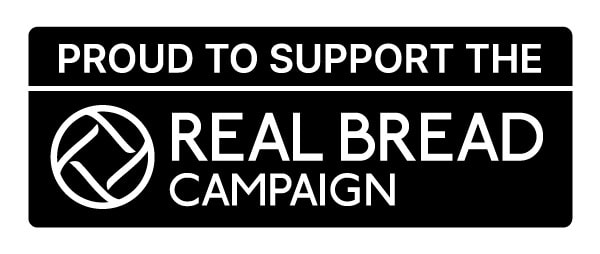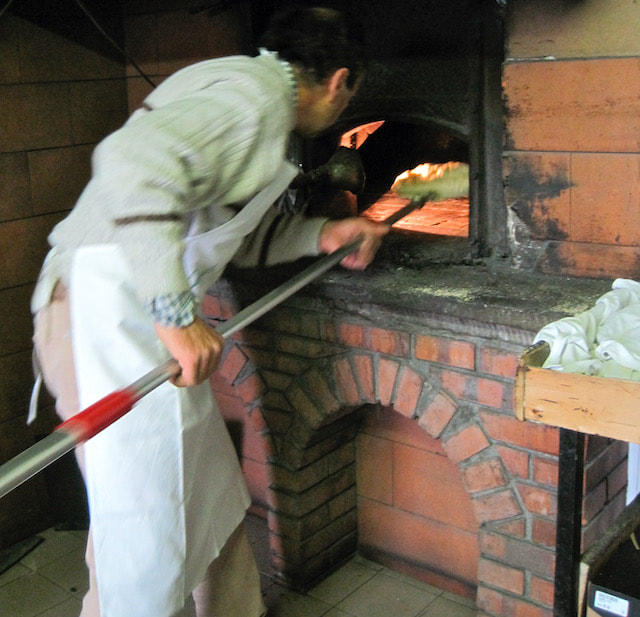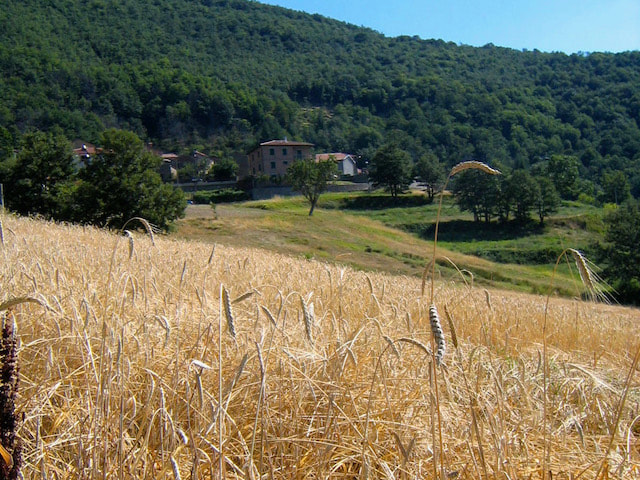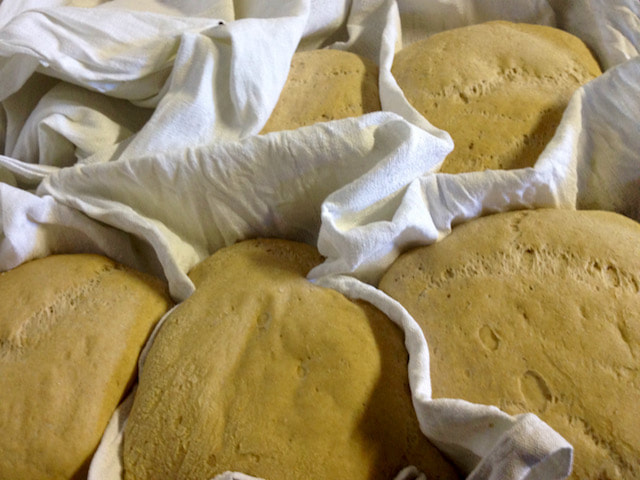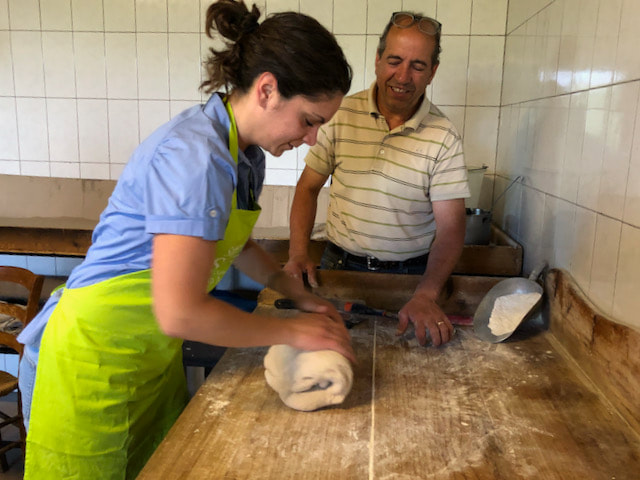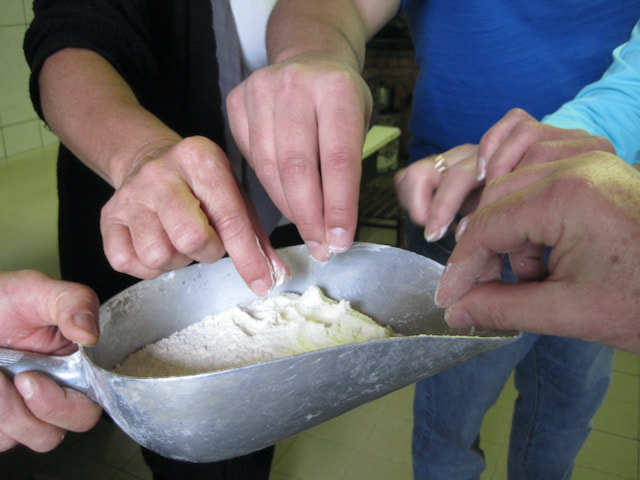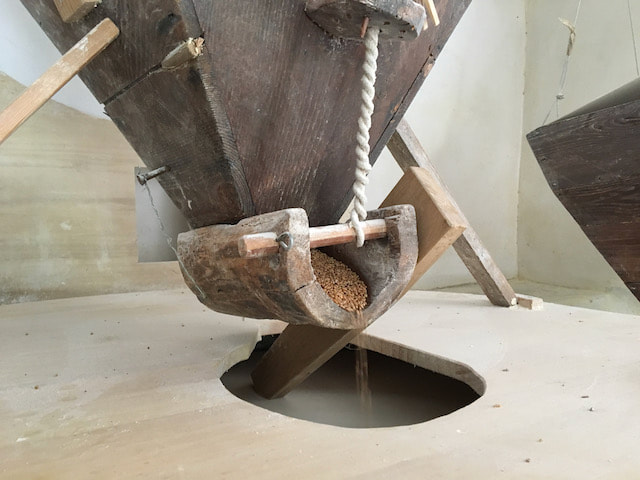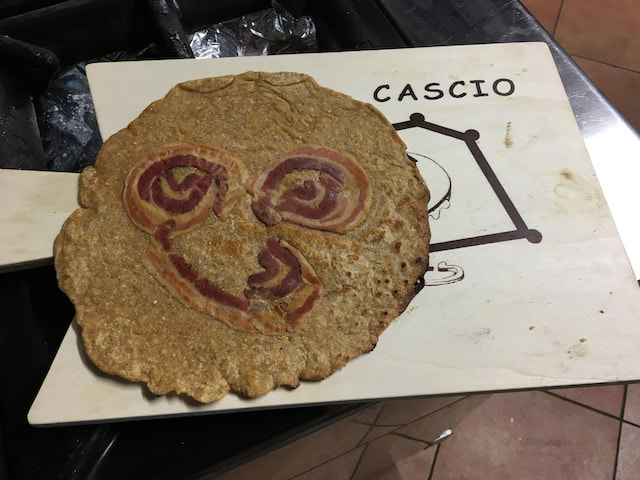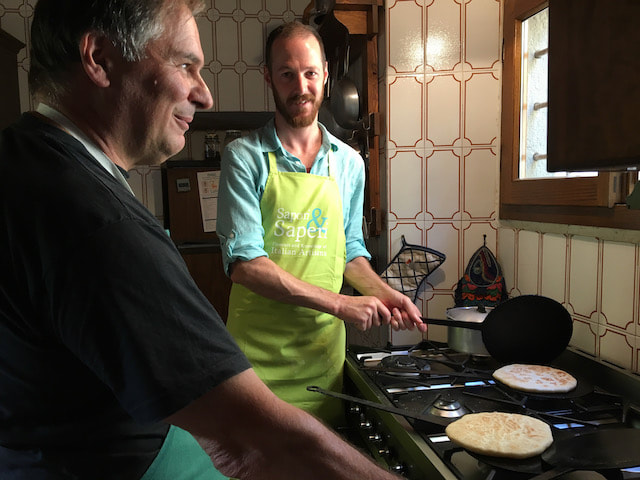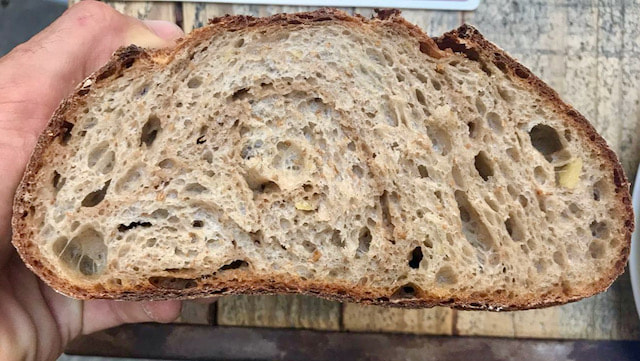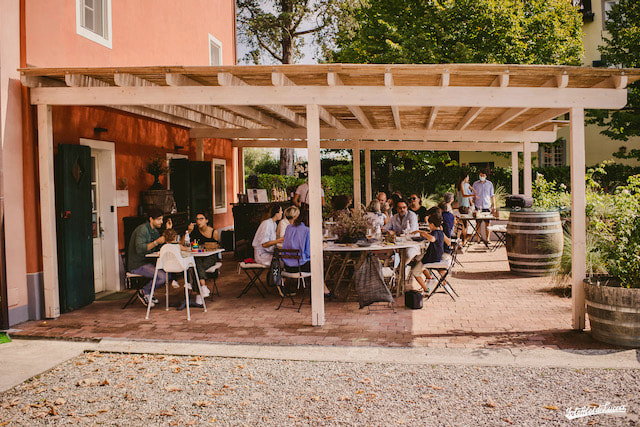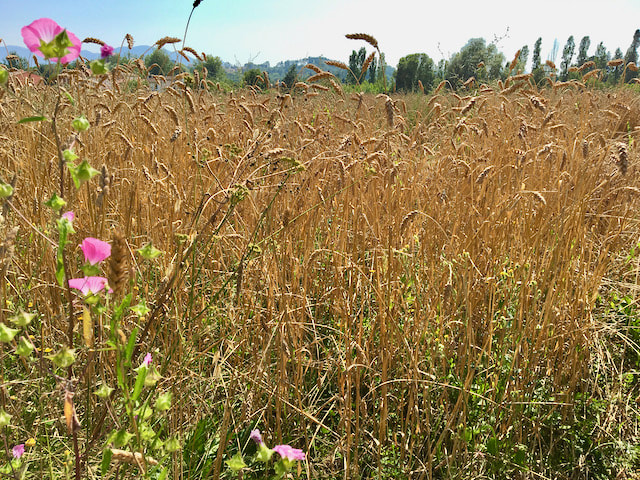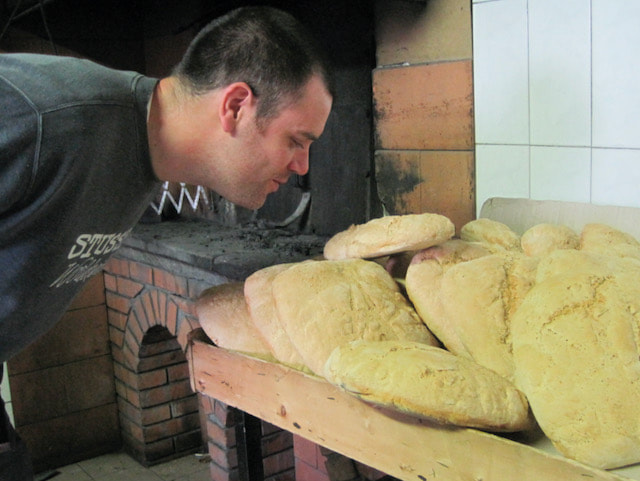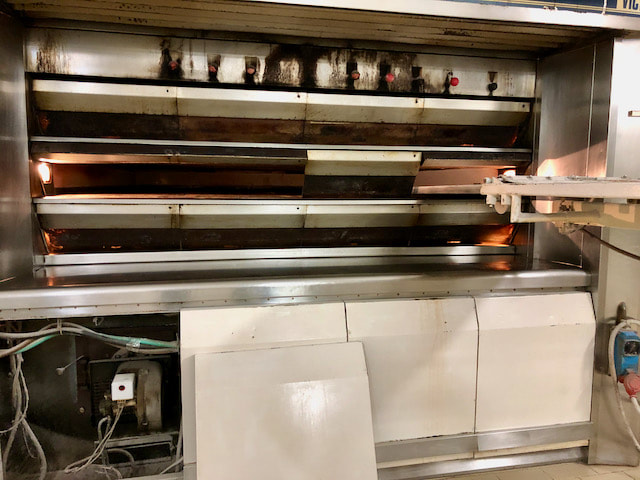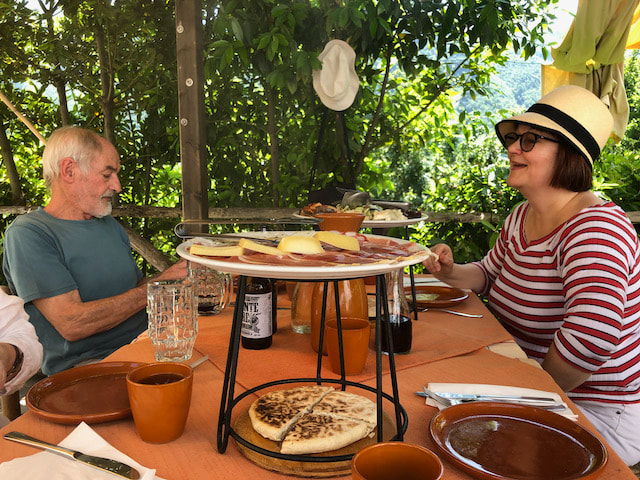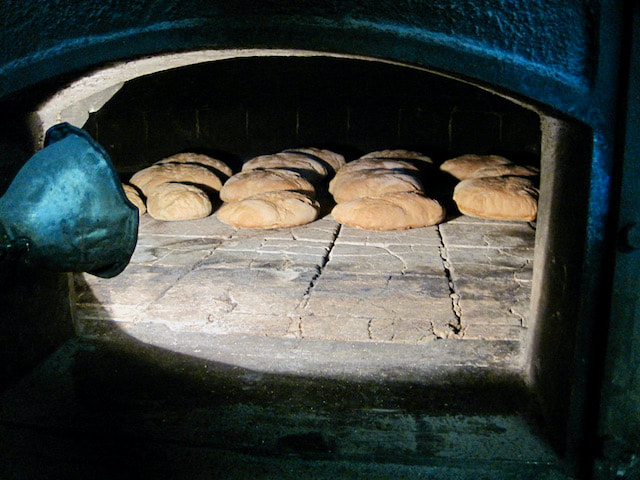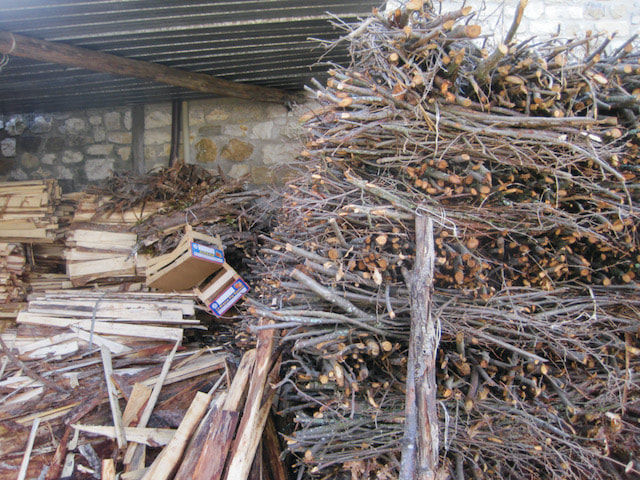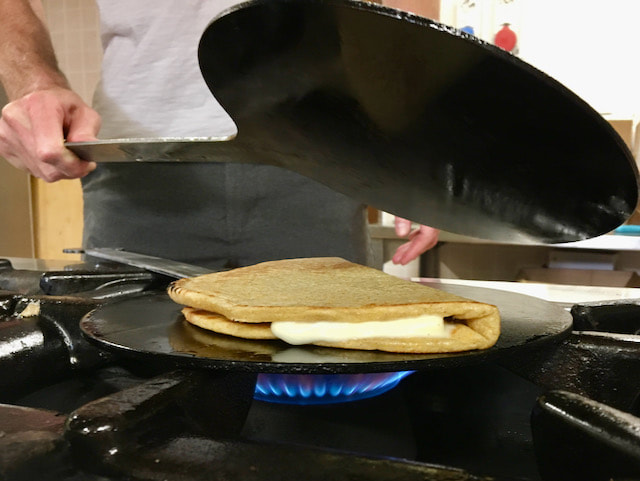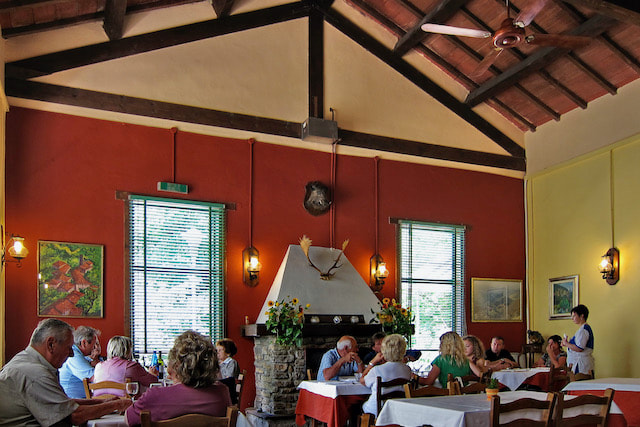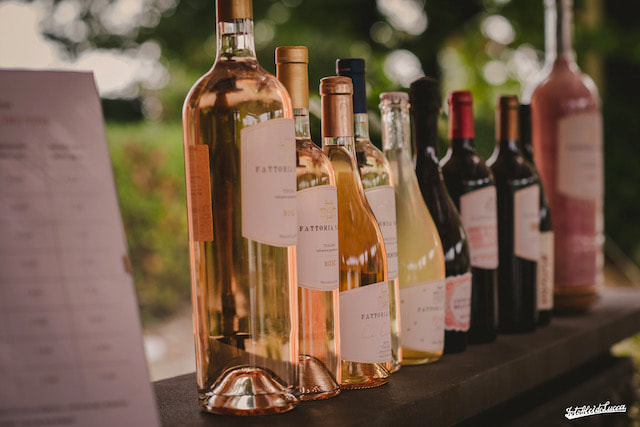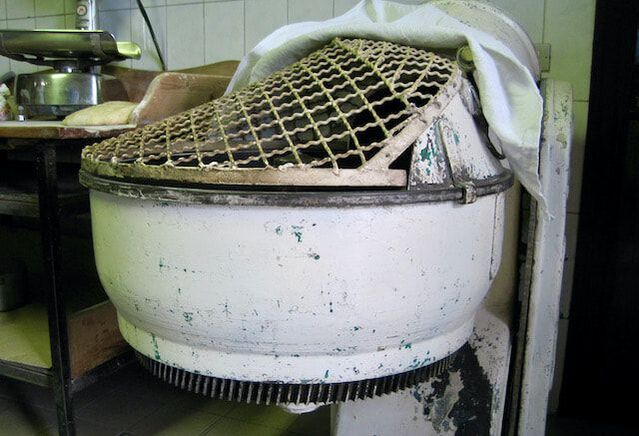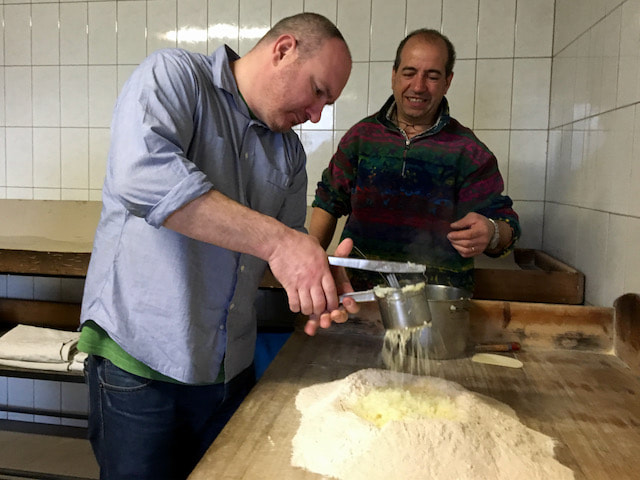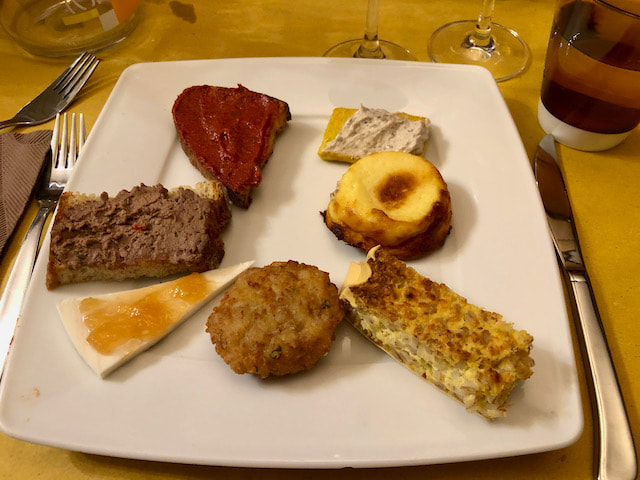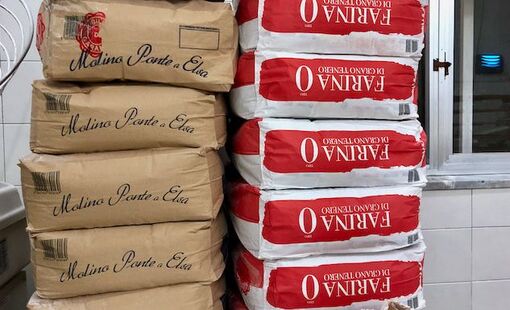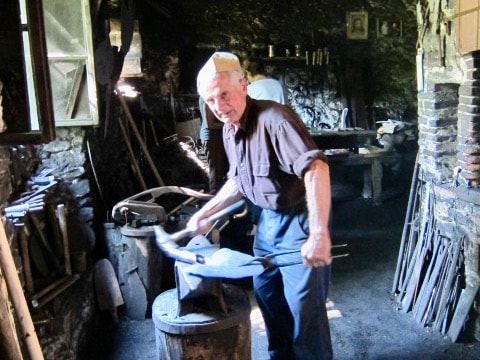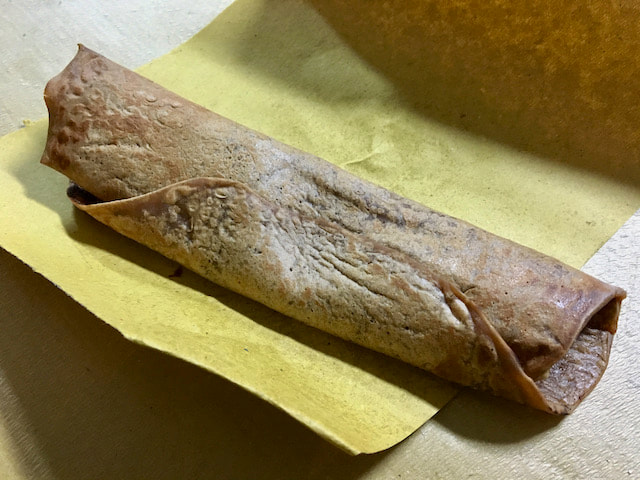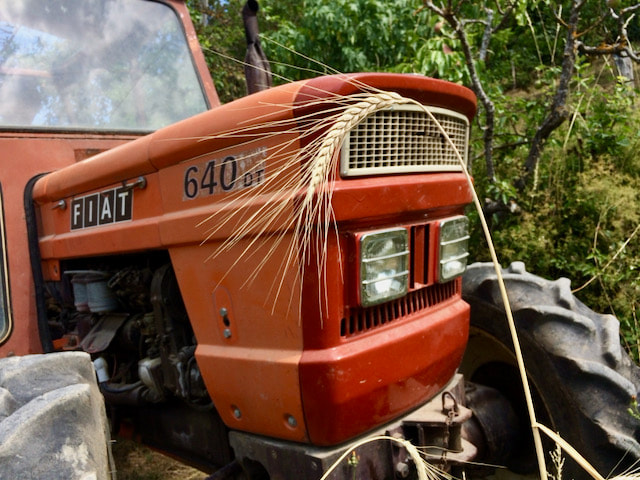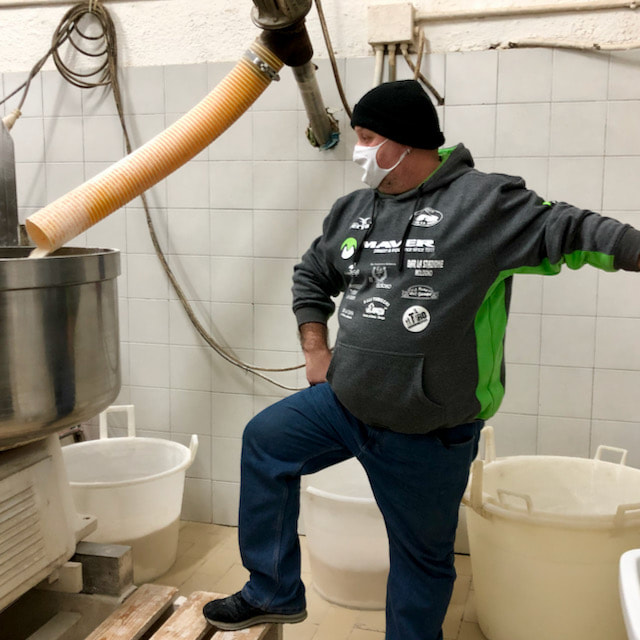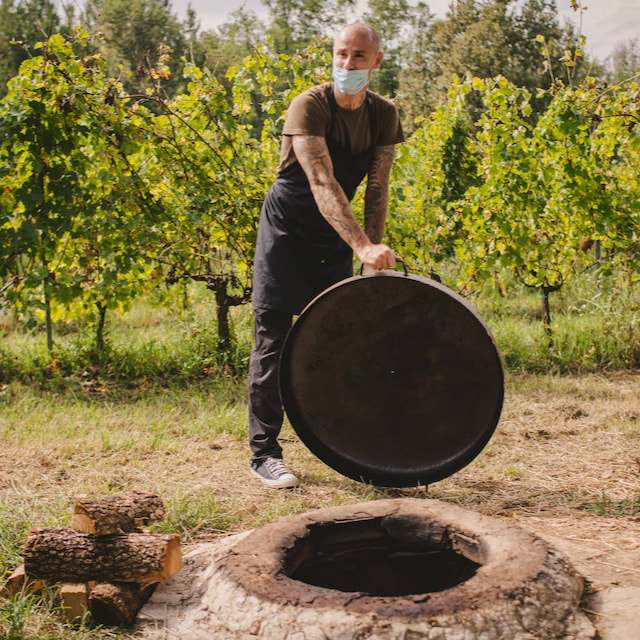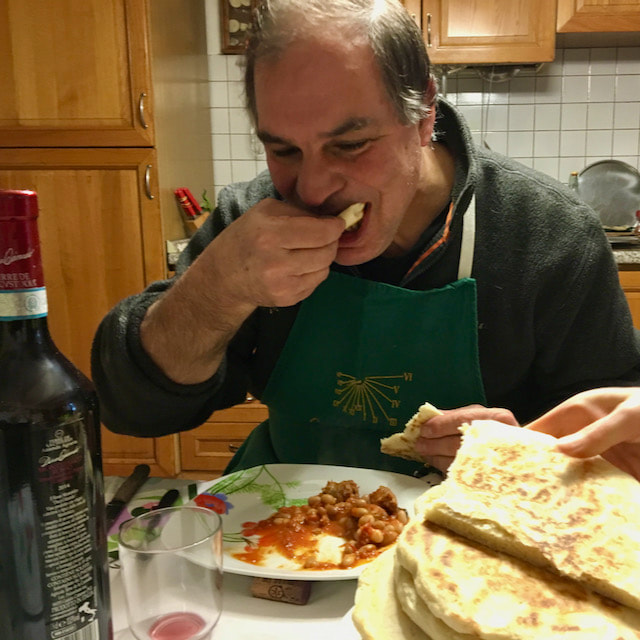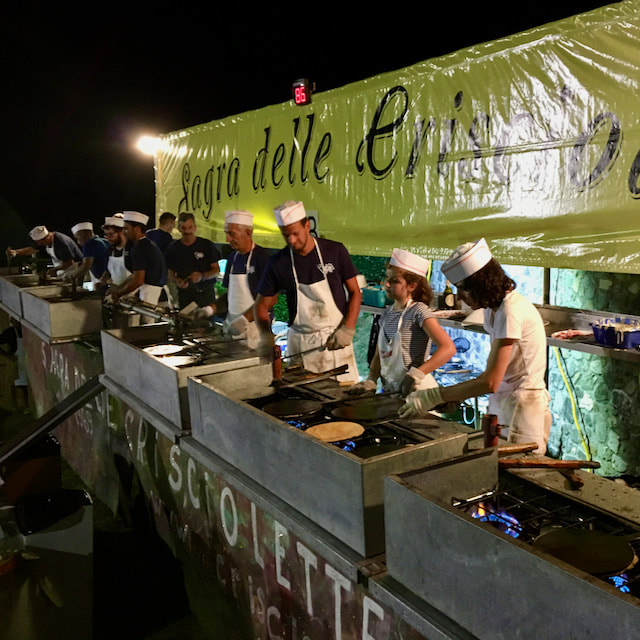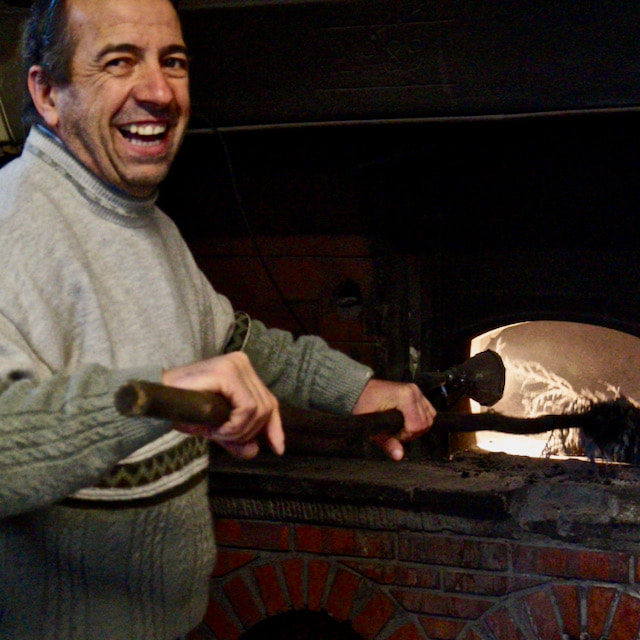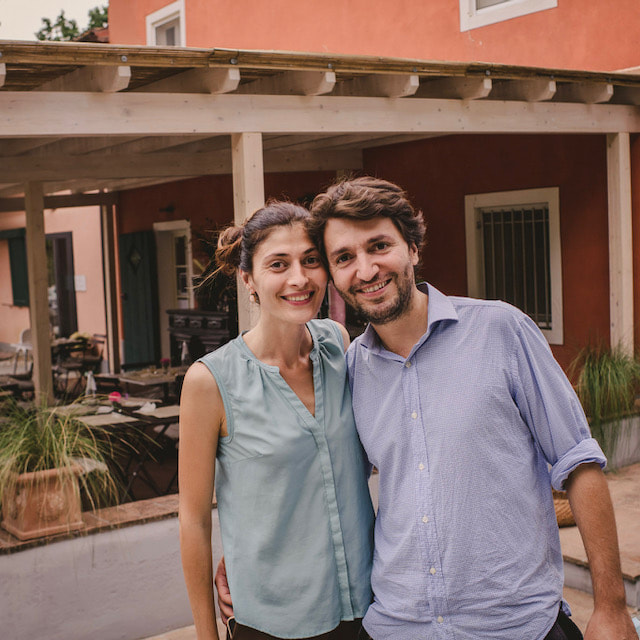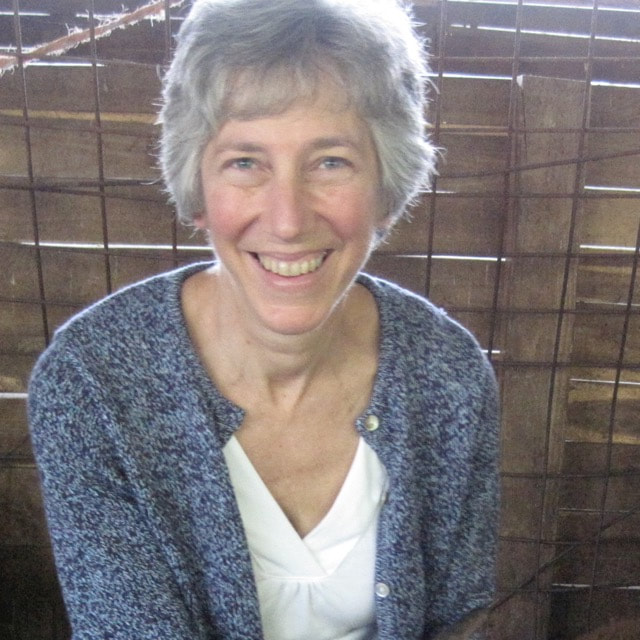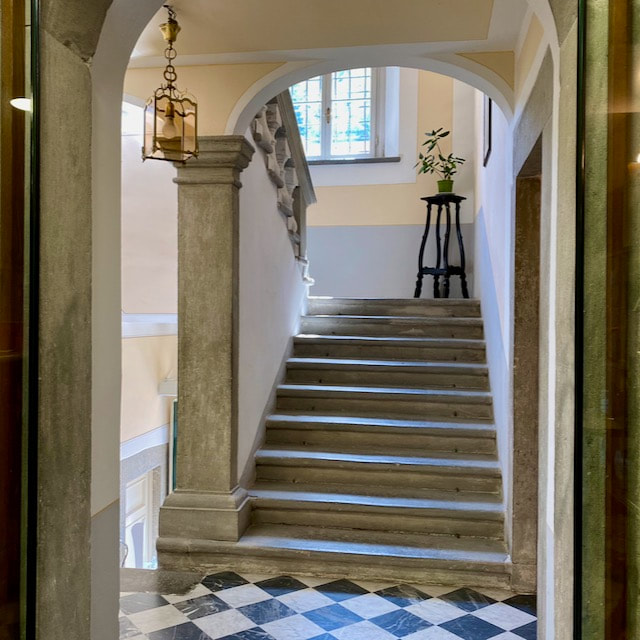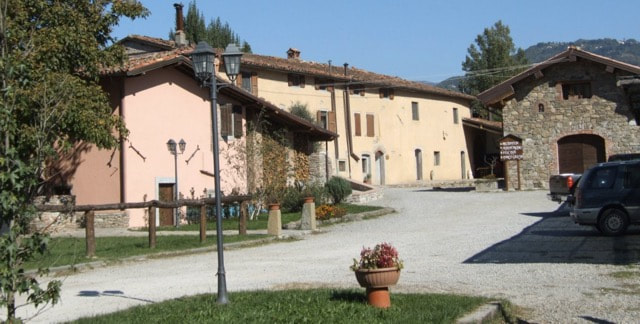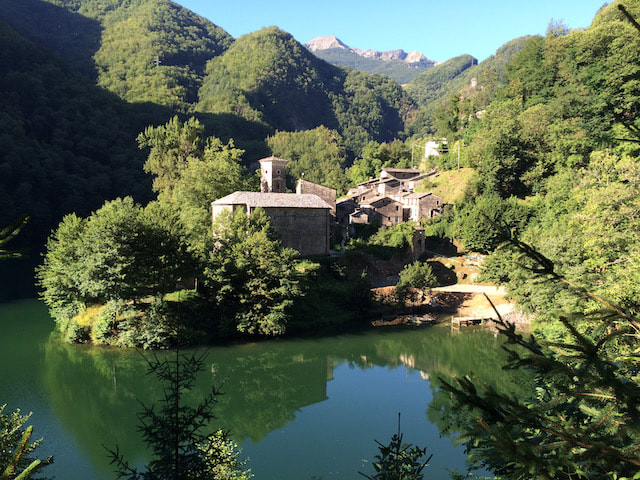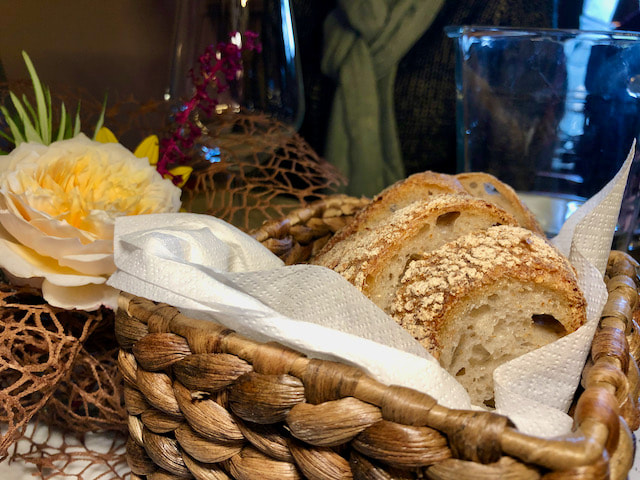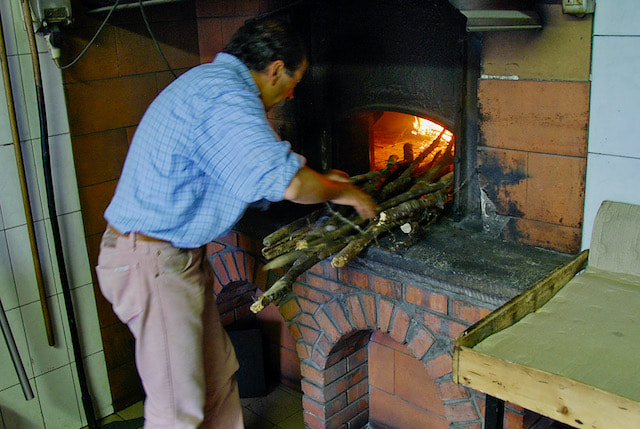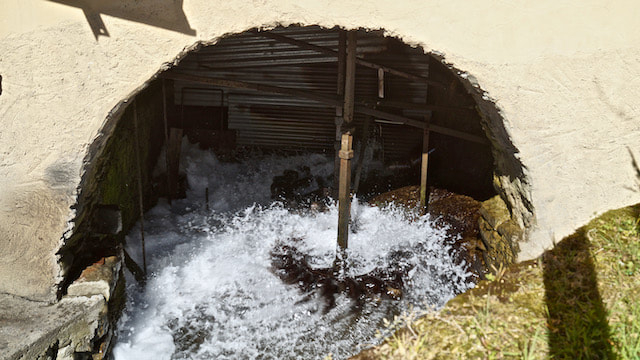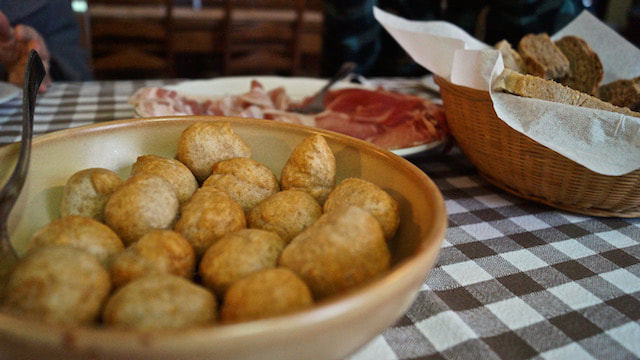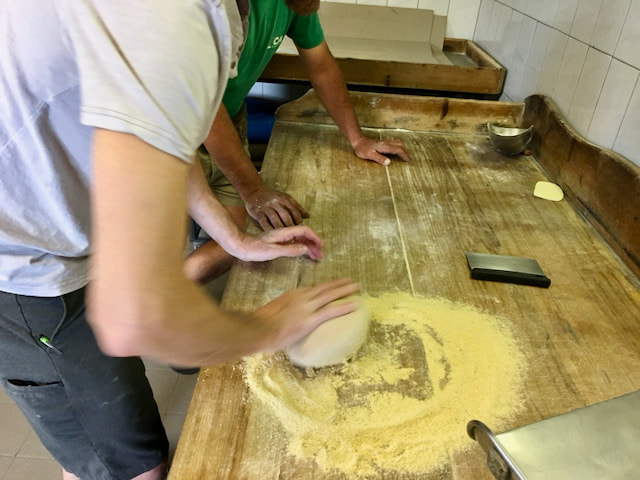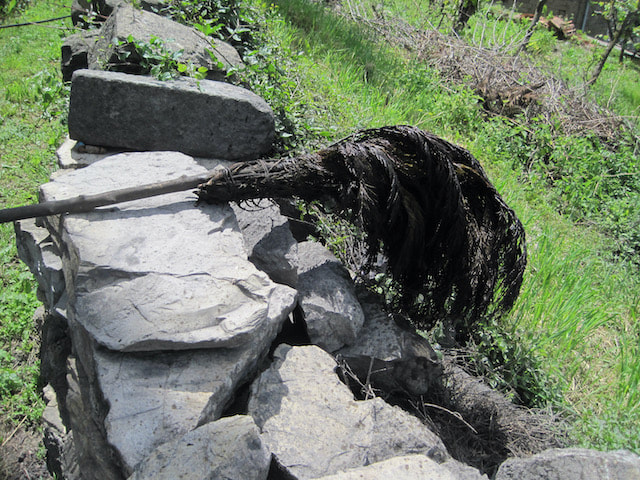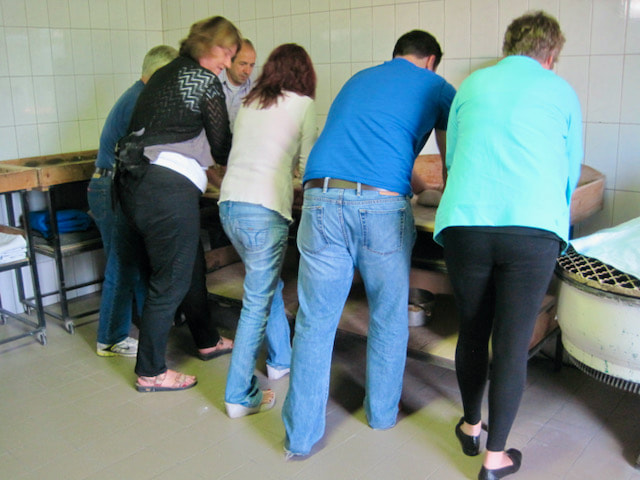|
Click on topics below for more information
|
2025: February 9–14
Availability: 6 places Sign up for our newsletter to receive updates Professional development course designed and led by Erica Jarman and five Real Bread bakers Tuscan bread has a bad reputation: at its worst it resembles cotton wool wrapped in cardboard and lacks salt. That's why this course takes place in Lucca Province. Lucca was a separate state until 1847. Our bread contains salt, the crust is crunchy and the crumb is moist. During this course you have hands-on classes with five artisan bakers, including a chef who teaches you his sourdough bread using flour from heritage grains and a village baker who bakes the Slow Food Presidium Garfagnana potato bread in a wood-fired oven. In our mountains you learn the flatbreads and yeasted griddle breads that make tasty snacks, wraps and sandwiches. You visit a working water mill and a blacksmith who makes griddles. You gain new skills and inspiration for new products. Course suitable for professional bakers, chefs and keen amateurs. Taught in English. Maximum course size: 7 people. Click on topics below for more information To request a booking form email [email protected] |
|
Course at a glance Sunday Arrival Pisa Airport or train station. For more arrival details please click Prices & Stuff tab above. Transfer to Park Hotel Regina, Bagni di Lucca (1 hour) Session 1: Introduction to the course Welcome dinner at Buca di Baldabò, Vico Pancellorum Session 2: Daily bread at family bakery: watch production Monday Session 3: Visit blacksmith at water-driven forge to see how traditional griddles are made Transfer to Fattoria Sardi (vineyard) Lunch cooked by Damiano Donati, chef and baker Session 4: Sourdough bread with Damiano Donati: hands on from lievito madre (starter culture) to the dough using stoneground flour of heritage wheat varieties Transfer to Park Hotel Regina Dinner at Agriturismo La Torre Tuesday Transfer to Fattoria Sardi Session 5: Sourdough bread with Damiano Donati: feeding the madre, from dough to oven, how to fit sourdough into your restaurant routine (continued after lunch) Session 6: Tour of biodynamic vineyard and cellars Lunch at Fattoria Sardi with wine tasting Session 5 continued Transfer to Park Hotel Regina Dinner at Pizzeria Trovaposo, Fornaci di Barga Wednesday Transfer to Gallicano Session 7: Griddle bread Fogaccia leva of Gallicano with Cesare da Prato and Giulio Baldacci Lunch: Fogaccia leva with traditional accompaniments Transfer to Agriturismo Venturo where we stay for the rest of the course Transfer to Piezza Session 8: Mulino di Piezza, a functioning water mill Transfer to Cascio Session 9: Flat breads crisciolette and necci with Alessandro Bertolini and his team from Cascio Dinner at Agriturismo Venturo, Castelnuovo di Garfagnana Thursday Transfer to Petrognola Session 10: Slow Food Presidium Garfagnana potato bread with Paolo Magazzini: lievito madre and beer yeast, stoneground farro flour and mashed potato, wood-fired oven Session 11: Visit to Paolo's farro polishing machine and free range beef cattle during gaps in bread making Lunch cooked by Paolo's wife Session 13: Q&A, course evaluation and presentation of course certificates Visit Fortezza Verrucole, San Romano Farewell dinner & wine tasting at Cantina Bravi, Camporgiano Friday Departure: Transfer to Lucca and Pisa. For more departure details please click Prices & Stuff tab above. For more details of course, please click Course tab above To request a booking form email [email protected] |
|
Sunday Arrive Pisa airport or Pisa Centrale train station One pick up only no later than 2.30 pm Transfer to accommodation at Park Hotel Regina, Bagni di Lucca (1 hr) You may not drive your own car during the course. If you want to arrive by car, you may park it at Park Hotel Regina for free. Please ask for details. Session 1: Introduction and theory with Erica Jarman
Welcome dinner at Buca di Baldabò, Vico Pancellorum One of my favourite restaurants in the area. Owner-chef Giovanna is from Parma which is why her pasta is so light, silky. Session 2: Daily bread at family bakery Pane del Gonzo: Baker Stefano Bechelli shows you how he makes bread, focaccia, ciabatta and panini virtually single handedly with the assistance of modern technology, such as spiral mixers, an oven loader and deck oven. He selects his ingredients carefully from as nearby as possible, including Tuscan salt from Volterra. An excellent model of how to make an additive-free loaf in sufficient quantities to supply several villages and support his family. Accommodation: Park Hotel Regina, Bagni di Lucca | Meals: Dinner Monday Breakfast and transfer to Piegaio (Pescaglia) Session 3: Visit blacksmith Carlo Galgani at water-driven forge to see how traditional griddles are made. Transfer to Fattoria Sardi (Lucca), a biodynamic vineyard where chef and baker Damiano Donati has his restaurant Fuoco e Materia (Fire and Food) Lunch prepared by Damiano Donati accoompanied by Fattoria Sardi wine Session 4: Sourdough bread: You have a day and a half of hands-on sessions with Damiano Donati. This afternoon you start your own lievito madre (starter culture) and mix the dough using Damiano's lievito madre. You'll be using stoneground flour of heritage wheat varieties cultivated by organic farmer Guido Favilla in fields owned by Fattoria Sardi. Transfer to Park Hotel Regina, Bagni di Lucca Dinner at I Macelli, Borgo a Mozzano Accommodation: Park Hotel Regina, Bagni di Lucca | Meals: Breakfast, Lunch, Dinner Tuesday Breakfast and transfer to Fattoria Sardi Session 5: Sourdough bread with Damiano Donati: feeding the madre, from dough to oven, what you can do with excess madre, how to fit sourdough into your restaurant routine (continued after lunch) Session 6: Tour of biodynamic vineyard and cellars Lunch at Fattoria Sardi with wine tasting Session 5 continued Transfer to Park Hotel Regina, Bagni di Lucca Dinner at Pizzeria Trovaposo, Fornaci di Barga Owner Floriano will explain why his pizza crust is feather light before we feast on the best pizzas in the valley. Accommodation: Park Hotel Regina, Bagni di Lucca | Meals: Breakfast, Lunch, Dinner Wednesday Breakfast and transfer to Gallicano Session 7: Fogaccia leva of Gallicano with Cesare da Prato and Giulo Baldacci Fogaccia leva is a yeasted bread baked between cotte (or testi, depending on where you're from), two iron disks heated over a flame. It is commonly served at home and in restaurants as an antipasto with assorted salumi and cheeses. It may also accompany a main course of fagioli all'uccelletto made with the local 'giallorino' bean. You make the fogaccia and fagioli all'uccelletto. Lunch: Fogaccia leva with traditional accompaniments Transfer to Agriturismo Venturo, Castelnuovo di Garfagnana where we stay for the rest of the course and where you can rest after your abundant lunch. Transfer to Piezza Session 8: Mulino di Piezza, a functioning water mill built in 1736, where you meet the young miller Matteo, who grinds wheat, corn, chestnuts and chickpeas. You see the millstones and the mechanism that drives them. Flour is available to buy. Transfer to Cascio Session 9: Flat breads crisciolette and necci with Alessandro Bertolini and his team from Cascio The village of Cascio claims to be the only place in the world that makes crisciolette, a tortilla-type flatbread baked between cotte. You can eat them plain or with pancetta cooked between the cotte in the batter or wrapped around fresh pecorino cheese. The neccio is a chestnut flour flatbread also cooked between cotte and usually served wrapped around ricotta. It is naturally sweet and makes a good dessert. Transfer to Barga Barga is a picturesque mediaeval hilltop town with my favourite cathedral. From the terrace in front of the cathedral you have a magnificent panoramic view of the limestone crags of the Alpi Apuane. Transfer to Agriturismo Venturo Dinner at Venturo Accommodation: Agriturismo Venturo, Castelnuovo di Garfagnana | Meals: Breakfast, Lunch, Dinner Thursday Breakfast and transfer to Petrognola Session 10: Slow Food Presidium Garfagnana potato bread with Paolo Magazzini: Paolo adheres to the traditional recipe of Paolo's mother who was the village baker before her early death when Paolo took over the bakery and greatly expanded production. The recipe uses Paolo's mother's lievito madre plus beer yeast, Paolo's stoneground farro flour and potatoes and salt. You mix the dough, shape the loaves and load the wood-fired oven. By request we can arrive early enough to watch the end of the production before our hands-on session. Session 11: Visit to Paolo's farro polishing machine and free range beef cattle during gaps in bread making Traditional Garfagnana lunch cooked by Paolo's wife Session 12: Q&A, course evaluation and presentation of course certificates Visit Fortezza Verrucole, San Romano A private tour introducing you to foodstuffs of historical Garfagnana within the walls of a Renaissance fortress. Farewell dinner & wine tasting at Cantina Bravi, Camporgiano Alessandro Bravi is the winemaker and his father Stefano is the chef. Alessandro is taking advantage of his high altitude micro-climates and indigenous varieties of grapes blended with better known ones to make some special wines. Accommodation: Agriturismo Venturo, Castelnuovo di Garfagnana | Meals: Breakfast, Lunch, Dinner Friday Breakfast and departure from Agriturismo Venturo Transfer to Lucca and Pisa airport or train station There will be one transfer no earlier than 8.30 am to arrive at Lucca at 9.30, Pisa airport at 10.15 and Pisa station at 10.30 am. If you need to leave earlier, I can arrange a special transfer at your own expense. To request a booking form email [email protected] |
Course Instructors
|
Stefano Bechelli Stefano is my local baker. I eat his bread every day, and every day it's different. A true sign of an artisan product. When he was 15 he became an apprentice in a family bakery at Bagni di Lucca. He then got a job at a paper mill. When our old baker wanted to retire, Stefano was ready to step into his shoes. He bakes additive-free traditional bread using modern machines to make it possible to produce enough for his customers. He selects his flour carefully from mills in Tuscany and Emilia-Romagna. Although he uses beer yeast, he also adds pasta acida (dough reserved from the last baking) to enhance the flavour. He's experimental too. He makes a seeded wholemeal focaccia, which takes a bit of selling to get his conservative clients to taste it. His latest toy is an oven loader which allows him to load a whole shelf of proved loaves into his deck oven at once. |
|
Damiano Donati Damiano is a chef with a passion for bread. He started making sourdough bread during a period of work experience at Le Calandre, the 3-star Michelin restaurant in Padua. By 2010 he was making sourdough regularly at his restaurant Il Serendepico, outside Lucca. Apart from home baking by Italian mammas, sourdough had pretty much died out in Italy. Damiano remembers that the flavour, the texture and aroma of bread was much less interesting then. For him it's the starter dough that keeps him fascinated. Being a living thing you have to follow its life cycle and intervene to encourage it to work in your favour. It has to be cared for, interpreted and tamed. Now he is the resident chef at the vineyard Fattoria Sardi where he has a wood-fired oven in which to bake his bread and many of the other dishes for their restaurant Fuoco e Materia (Fire and Food). He has always been an experimental chef, and lockdown has given him time to dig a forno a turco (Turkish-style oven) into the ground next to the vineyard. He will certainly inspire you to share his enthusiasms. |
|
Cesare da Prato Cesare is president of the Buffardello group which is dedicated to preserving and promoting traditions of the Garfagnana. He's from Gallicano which from the 15th to the 19th century lay on the border between the Republic of Lucca and the Duchy of Modena over the Apennine mountains, and flip-flopped between the two. Attempting to hide in the crack between the two regimes, it developed its own cuisine, of which the fogaccia leva is a relict. Cesare learned it from his mother and was chief fogaccia cook at the fogaccia leva festival which used to take place annually. |
|
Alessandro Bertolini & the team from Cascio Every year the Sport and Recreation Association of the village of Cascio puts on several festivals. The Sagra delle Crisciolette outshines them all for its sheer showmanship. On a raised stage stands a row of gas burners and behind each is a crisciolette cook with a bowl of batter (wheat flour and cornmeal), a plate of pancetta and a pair of testi (griddles). As soon as one is ready, the cook runs it to a slide down which it slips to servers waiting at the bottom to dole them out to the hungry crowd. Credit for this virtuosic display goes to the Association's president Alessandro Bertolini and his village team. They are delighted that foreigners want to learn to make their local flatbread. |
|
Paolo Magazzini Paolo Magazzini is a farro and beef farmer as well as the baker in Petrognola (Tuscany). His mother was the village baker until she died in 2000. As she was fading, Paolo realised how sad she was that her potato bread wouldn’t live on and promised he would continue to bake it, which he does using her lievito madre (starter dough) that is more than fifty years old. He built a new wood-fired oven which holds fifty 1-kilo loaves, and uses an ancient electric dough kneader. Otherwise he hasn't changed a thing. The recipe still contains his own stoneground farro flour and potatoes. His Garfagnana potato bread is now a Slow Food Presidium. He delivers it himself down the Serchio River Valley as far as Lucca and beyond. He has never done any marketing. Word of mouth and a single mouthful attests to its goodness. |
|
Fattoria Sardi Mina and Matteo Giustiniani are our hosts for the sourdough sessions with Damiano Donati. Mina was born in Greece and studied chemistry, enology and viticulture in Bordeaux, where she met her husband. Matteo was born in Florence and inherited his grandfather's wine estate at Lucca. He went to Bordeaux to study enology and viticulture and met Mina. She worked at Chateau Margaux (Margaux) and Chateau La Tour Blanche (Sauternes). Matteo worked with Denis Dubourdieu, the top enologist in the world at that time, who taught him, above all, sensitivity and respect for a true terroir. In 2012 they returned to Lucca to manage Fattoria Sardi. They want to grow the historic family estate with a young approach, experimenting with organic and biodynamic methods, making wines that uniquely express the terroir and delight their customers. Matteo adds: 'I hope you find a fantastic combination between my wine and my second passion, good food'. |
Course Organiser
|
Erica Jarman Following Heather’s careers as archaeologist, orchestra and artist manager and chef, she Italianised her name to Erica and came to Lucca to pursue her passion for traditional artisan food. While living in Cambridge she baked all her own bread, including dabbling in sourdough. After moving to Casabasciana, she regularly made a sourdough version of Paolo Magazzini's Garfagnana potato bread using his mother's lievito madre. However, in the end she opted to support the local baker, Stefano Bechelli, and the village shop that sells his bread. |
|
Park Hotel Regina, Bagni di Lucca A hotel in a grand 19th-century building in the centre of the spa town of Bagni di Lucca. Local owner Roberto Marino-Merlo is excited about making his hotel energy efficient by installing the latest technology. He used to be a chef and still makes the breakfast jam himself. Wifi in rooms, swimming pool. |
|
Price Per person: 1980 Euros Non-participant in same room: 495 Euros Deposit: €300 when you book Balance: due 8 weeks before course starts Includes 5 nights welcoming, relaxing accommodation, en suite bathrooms Local ground transportation for 6 days Daily continental breakfast, 4 lunches, 5 dinners Course lectures and all activities shown on Course tab, course notes Non-participant fee includes: accommodation in same room as participant, transfers with participant to and from airport or station, daily continental breakfast, 5 dinners Does not include Airfares Travel and cancellation insurance Wine and drinks other than those served with meals, additional meals Personal expenses such as telephone, mini-bar, etc. Meeting points I recommend you arrive in Italy the day before the course starts to allow time for travel delays and to recover from jet lag. Where: Pisa airport, Pisa Centrale train station, Lucca station When: no later than 2.30 pm If everyone arrives earlier, we'll pick you up as soon as everyone is there. Recommended international travel: Nearest airports: Pisa Airlines from UK: British Airways, EasyJet, Ryanair Airlines from outside Europe: You may have to fly to another European city and take a connecting flight or train to Pisa Centrale. There are good low-cost flights from many European cities. There are better train connections from Rome than from Milan. Nearest train station: Pisa Centrale Departure points Where: Transfer to Lucca train station or Pisa airport or train station When: There will be one transfer no earlier than 8.30 am to arrive at Lucca station at 9.30 am, at Pisa airport at 10.15 am and Pisa station at 10.30 am. Please don’t book trains that leave Lucca before 9.45, Pisa before 10.45 or flights that leave before 11.45. If you need to leave earlier, I can arrange a special transfer at your own expense. Dress Informal. Jeans are acceptable everywhere. Weather February 3˚–12˚C / 37˚–54˚F, precipitation 69 mm / 2.7 in For more accurate weather forecasts nearer the time, please refer to this website https://www.ilmeteo.it/meteo/Bagni+di+Lucca Itinerary is subject to change if necessary due to weather or agricultural conditions or other events outside our control. To request a booking form email [email protected] |
Thank you SO, SO much for another extraordinary course - I have taken so much away with me in terms of learning about sourdough and techniques of shaping and kneading - takes practice though!! These amazing bakers you found for us to work with was fantastic - I love the range from commercial to high end restaurant bakers, and the wonderful one man band of Paolo and not to forget the cotte experiences. I'm on a high just thinking about it all.
Laura White, Artisan Bread Course Tuscany, February 2023
I thoroughly enjoyed the bread course. The variety of breads and styles of the bakers meant that no two days were the same. We were educated by wonderful Artisans. The food we ate and the cultural experiences each day were an equal match to our great baking experience.
Michael Doyle, Artisan Bread Course Tuscany, July 2023
Taking the Artisan Bread Course Tuscany with Erica was an amazing experience! The amount of learning that is fit into five days is impressive, and the food is in a class of its own. The real magic, however, is meeting the artisans in a personal setting, hearing their stories, and learning from people with generations of experience behind them. Priceless! Truly a week I will never forget.
Dana Roberts, retired aerospace engineer, Italy, Artisan Bread Course Tuscany, July 2022
Through theory and hands-on practice, Erica’s bread course provided extensive insight into various types of Italian breads and grain—from modern sourdough theory used by some of the best chefs in the world to traditional flatbread recipes passed down for generations in small communities within Tuscany.
Not only are you learning about the ingredients, history, and technique involved in the breads you are baking, but also about the artisans themselves including how they operate within their larger community. In addition to meeting grain millers and bread bakers, we got a front row seat to a cattle farm, multiple biodynamic vineyards, and a blacksmith whose family has been practicing their craft for over 500 years.
Erica lives her life dedicated to an ethos of supporting local versus commercial, artisan over industrial, and small-scale over mass production. From these local artisan economies we can learn so much, and her passion for sharing this with her class is both obvious and energizing.
Erica is an encyclopedia of knowledge when it comes to Italian regionality and artisan economies, and through this course she shared a window into a world I would never have known how to access on my own!
Olivia Cappelletti, chef, USA, Artisan Bread Course Tuscany, July 2022
From chestnut flour pancakes cooked on hand-made iron griddles to traditional and modern approaches to sourdough loaves, this course introduced us to the wide range of Northern Tuscan breads. We learnt also about the varieties of heritage grains used and their properties, as well as the intricacies of Italian flour types. A great experience added to by Erica’s usual provision of excellent food and wine, as well as her encyclopaedic knowledge of the local area and people.
Guy Kitteringham, publisher, UK, Artisan Bread Course Tuscany, July 2022

